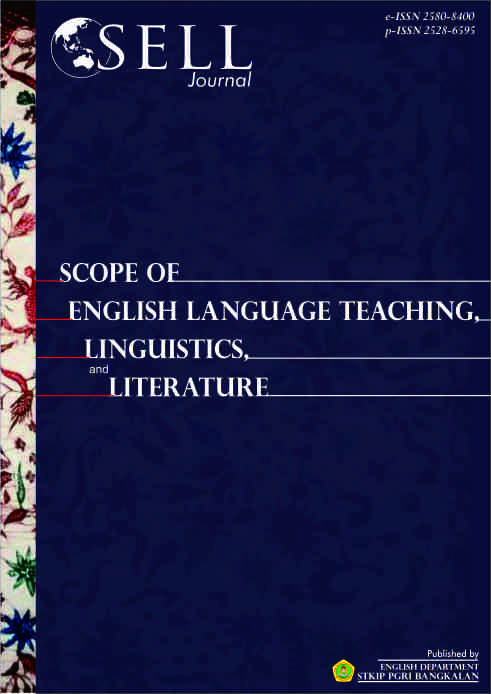Teaching Speaking Skills Using the Spinning Wheel Game in Senior High School
DOI:
https://doi.org/10.31597/sl.v10i2.1257Keywords:
qualitative research, speaking skills, spinning wheel gameAbstract
Students in Senior High School still have some difficulty in speaking English language fluently. The researcher of this study research the student’s speaking skill by using the Spinning Wheel Game media. In this study, the researcher used qualitative method with case study design. The researcher focuses on the student’s fluency in speaking English language. The primary data of this study is from the observation and the result of interview, meanwhile the secondary data is from books, journal, personal document, and official written documents. The instrument of this study are field note observation, interview guide, and documentation. The purpose of this study is to know the use of the Spinning Wheel Game in teaching speaking skill and the student’s response in using Spinning Wheel Game. The result of this study showed that Spinning Wheel Game helps students in the class. the students were active, enthusiastic, focused to the material and comprehend the material well. The Spinning Wheel Game media also helps students in speak English language in terms of their fluency and their confidence.
References
Adila, N. K. (2018). The Use of Wheel Decide Application To Improve Students ’ Speaking Skills English Education Study Program Faculty of Educational Sciences. 1–109. ecampus- fip.umj.ac.id
Bayu, D., Mahendra, S., Rofi’ah, S., & Saifudin, A.(2023). Developing Spinning Wheel and Flash Card Media on Descriptive Text To Teach Vocabulary for Students of Smk Darul Huda Blitar. PROJECT: Professional Journal of English Education, 6(4), 829–840.
Fatimatuzzahra, S., Muin, A., & Septiana, T. I. (2023). Enhancing Students ’ Speaking Skill By Utilizing Spinning Wheel at MTs Al-Ma ’ arif Kabupaten Serang. CELTI: Conference on English Language Teaching, 3(2003), 694–698.
Isola., R. (2019). The Concept of Teaching. Shanlax: International Journal of Education, 7(2), 5–8. https://doi.org/https://doi.org/10.34293/ education.v7i2.329.
Jaffar, R., Mustafa, N. H., Fadhil, N. F. M., Jusop, M., Shaharuddin, S., & Taliyang, S. M. (2024). 2024. J. Jaffar. An Innovation in Teaching and Learning of Accounting Concepts Using Accrual Spin Wheel Game.pdf. International Journak of Academic Research In Progressive Education & Development, 13(1), 1919–1927.
Mardhiyah, R. (2023). The Effectiveness of Spinning Wheel Game Towards Students’ Speaking Skill. 1, 1–80. http://etheses.uin- malang.ac.id/55058/
Permatasari, A., Halim, M. L. Al, Sriwulandari, N., Billfath, U., Billfath, U., & Gresik, U. (2024). The Effectivenes of Spinning Wheel Games to Improve Student’s Writing Skill in Descriptive Text. Horizon: Journal of Language, Literature and Linguistics, 2(1), 32–42.
Rachmaida, F., & Mutiarani, M. (2022). The Use of Spinning Wheel Games to Improve Students’ Writing Procedural Texts. Journal of Languages and Language Teaching, 10(4),530. https://doi.org/10.33394/jollt.v10i4.5766 Sofyan, A. (2020). The Use of Spinning Wheel Game in Teaching Speaking at the Seventh-Grade Student of SMPN 5 Kota Bima in Academic Year 2019/2020. 2, 38– 45.
Spinning Wheel Game on Students ’ Vocabulary Mastery at Ninth Grade of SMP Swasta Asuhan Medan. ELEJ (English Language Education Journal), 2(1), 15–29.
https://repository.ummat.ac.id/2022/ Wijaya, & Juliana. (2024). The Effect of Using Spinning Wheel Game.

Downloads
Published
How to Cite
Issue
Section
License
1. Copyright of this journal is possession of Editorial Board and Journal Manager, by the knowledge of author, whilst the moral right of the publication belongs to the author.
2. Legal formal aspect of journal publication accessibility refers to Creative Commons Atribution-ShareAlike (CC BY-SA), implies that this license lets others remix, adapt, and build upon your work even for commercial purposes, as long as they credit you and license their new creations under the identical terms. This license is often compared to “copyleft” free and open source software licenses.
3. Every publications (printed/electronic) are open access for educational purposes, research, and library. Other that the aims mentioned above, editorial board is not responsible for copyright violation














